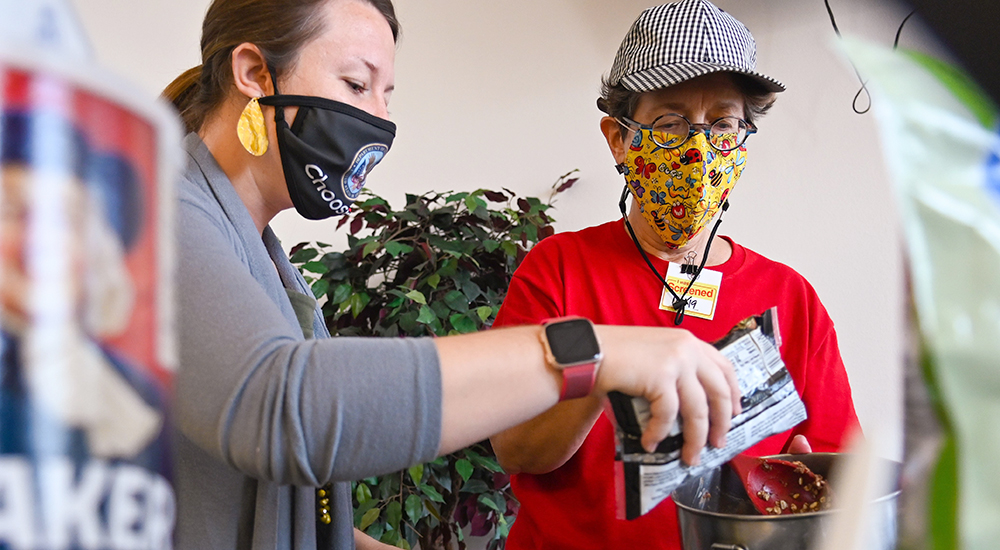The prevalence of diabetes in our society is a serious issue. Self-reflection about the growing problems with diabetes can be difficult but every Veteran needs to do it. Nearly one in four patients in VA health care has diabetes. According to the Centers for Disease Control and Prevention, more than 100 million Americans have diabetes or prediabetes.
The difficulty of any conversation about diabetes is centered on the fact that the disease requires major life changes. Whether you have diabetes or are drawing closer to acquiring diabetes – or are pre-diabetic – the most important thing to know is that there are actions you can take to fight it.
“Type two diabetes is entirely manageable by diet, and can be prevented by diet,” said Marcia Merrell, the Chief of Nutrition and Food Services for West Texas VA Health Care System. “It is one of very few diseases that can actually be prevented by dietary intervention.”
Photo above: While preparing diabetes-friendly no-bake cookies, Clinical Dietitian RoChelle Crow pours chocolate chips while Marcia Merrell, Chief of Nutrition and Food Services, discusses the healthy attributes of this favorite desert recipe.
Blood tests are best way to know
When a person is pre-diabetic there are rarely clear symptoms. The best way to know if you are pre-diabetic comes from routine health care and blood tests. An A1C, one of the basic blood tests performed in a routine screening, is the key to knowing where you fall when it comes to diabetes.
What is A1C?
“The A1C gives doctors an image of what the last three months look like,” Crow said. “The test can help identify pre-diabetes in time to make the necessary lifestyle changes to stave off becoming diabetic. When your A1C count reaches a certain point, between 5.7 and 6.5, you are considered pre-diabetic, and it’s no longer time for caution but a time for change.”
While genetics can play a role in determining if you are at risk for diabetes, diet and physical activity play an even larger role in the likelihood of getting the disease. No matter how you got it, once you have it, it will be with you the rest of your life.
“I always tell people, no matter what causes your diabetes, how you control it is the same across the board. It’s always your choice, your decision, but diet and physical activity is how you manage and prevent this disease.”

While preparing a diabetes-friendly desert, Merrell stirs in oats for no-bake cookies. Merrell hosts multiple cooking and weight management classes for Veterans looking to improve their health.
Control through nutrition
Once the realities of a diabetes diagnosis have been realized, Veterans at West Texas VA have a multitude of resources to aid them in making the lifestyle changes that will help lessen the impacts of diabetes. And that will control the progression of the disease.
One such resource are the monthly nutrition and activity classes available for all Veterans. One class aimed at improving diet is the kitchen class offered by Merrell and Crow.
“We try to have fun in our kitchen classes,” said Merrell. “A lot of light banter and talking back and forth between us and our Veterans, all being very collaborative. We’re not going to make anyone a top chef but we will give them tasty and healthy cooking options with a focus on controlling or staving off diabetes.”
The goal for any classes is to provide options for Veterans to improve their health through good nutrition.
“We want everyone participating to ask questions, to find ways to improve their situation. For me, cooking classes are all about inspiration. It’s really about inspiring you to do more research and inspiring you to ask questions.”
November is diabetes awareness month
With the growing concerns associated with the disease, West Texas VA wants to ensure that every Veteran has access to the care they deserve. It is through the nutrition and activity classes that Veterans can learn and take control. As we move into the holidays and new year, we will be producing a monthly video series promoting healthy eating and inspiration.
West Texas VA Health Care System proudly serves Veterans in 33 counties across 55,000 square miles of rural geography in West Texas and Eastern New Mexico. The George H. O’Brien, Jr. VA Medical Center is located in Big Spring, Texas, and serves as the headquarters for the Wilson & Young Medal of Honor VA Outpatient Clinic located in Midland/Odessa, Texas, and four other CBOCs located in Abilene, TX, San Angelo, TX and Hobbs, NM. Additionally, WTVAHCS operates two outreach clinics in Stamford, TX, and Fort Stockton, TX. Two Vet Centers also provide services in Abilene and Midland, TX. More than 56,000 Veterans reside within the service area, of which approximately 17,000 receive care at West Texas VA. On average, the health care system supports more than 170,000 outpatient visits annually.
William Hatton is a public affairs specialist and U.S. Army Veteran.
Topics in this story
More Stories
Veteran Byron Potier weighed almost 300 pounds and was tired and lethargic. He was the perfect candidate for gastric sleeve surgery.
How much do you know about VA care, benefits and services? Don’t miss out on what you've earned—check out the "2025 VA Federal Benefits Guide for Veterans, Dependents, Survivors, and Caregivers" handbook to learn more.
Feeling stressed? Your breath can help you relax and focus. Take 3 minutes to reset and prioritize your well being for this week's #LiveWholeHealth practice.






